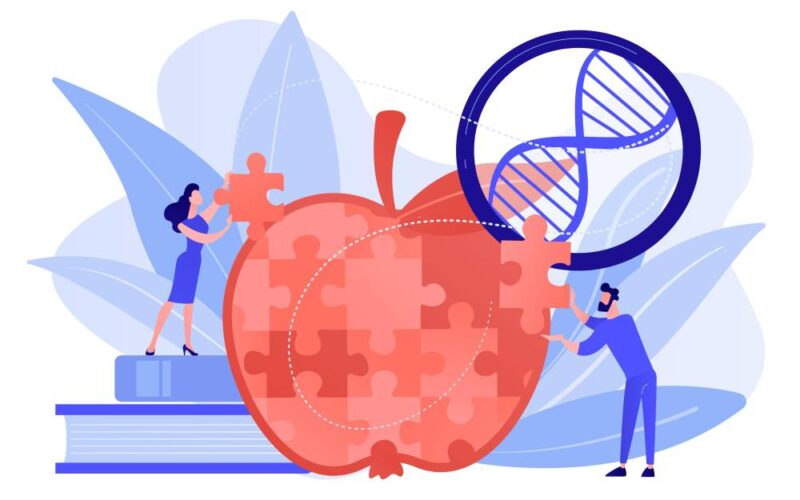What are GMOs?
Genetically modified organisms are new varieties developed by artificially combining genes that are not present in a particular organism using genetic engineering technology. The technology, which combines genes to create new varieties, is being used in various fields, such as livestock production, crop cultivation, and pet breeding. GMOs produced through genetic engineering are now common in everyday life. For example, according to a survey, 92% of all corn and 94% of soybeans grown in the United States in 2018 were genetically modified crops (Cassetty, 2020). While these GMOs are helpful to human society, they also present some disadvantages. Thus, GMOs are seen as a constant source of controversy.
What are pros and cons of GMO foods?
Advantages of GMO
- By modifying the genes of many crops, crop damage from pests and insects can be prevented. Using these methods can reduce the use of pesticides that are harmful to humans. In fact, an analysis of GMO technology use cases found that crop yields rose 22% despite reducing pesticide use by 37% (Raman, 2020).
- GMO technology also makes it possible for crops to grow even in harsh conditions, unlike common non-GMOs, which have difficulty surviving under environmental conditions. These factors allow farmers and consumers to access crops at a lower cost.
- Finally, the nutritional value of food can be increased through genetic modification technology. For example, rice containing beta-carotene has been developed for locals who lack vitamin A due to the influence of local eating habits (Raman, 2020).
Concerns about GMOs
While not all experts agree with the claim, some argue that GMO crops are at risk of harming human health.
- Modified DNA from GMOs can cause allergies in people who are not allergic to food. As an example, GMO crops made using the DNA of nuts in Brazil have been found to be dangerous for people with nut allergies. Thus, this GMO crop was discarded without being distributed to the public. However, there are no reports of allergies to GMO foods currently in circulation, so it is hardly considered a concern for all GMO crops (Cassetty, 2020).
- There are concerns that GMO foods can cause cancer. This concern arose from a study. Early in GMO development, a study of mice found that GMO food intake could expose them to cancer and various diseases. Thus, it is feared that modified DNA from GMO foods could affect people’s genes. However, this study was withdrawn due to the evaluation that the method and design were insufficient.
Explain the use of genetically modified organisms in various fields
GMOs in Agriculture
As explained above, a representative field applying GMO technology is agriculture. Currently, many crops are grown through genetic modification. These genetic modification technologies enabled crops to be grown under various environmental conditions, leading to lower costs for farmers and consumers. In addition, genetic modification technology has made it possible for GMO crops to have nutrients that people want.
GMOs in medical research
Genetic modification technology has been considered an important research element in biomedical research and development since the beginning. In particular, in relation to drug development, it has established itself as an important research element by enabling the production of safer and cheaper vaccines or treatments using genetically modified organisms. In addition, GMO insects are also considered research subjects to prevent parasitic diseases. For example, there is a case of developing GMO mosquitoes to prevent transmission by malaria mosquitoes.
Application of GMOs to improve environmental problems
Plastic, a substance that is really widely used in human life, is convenient, but it takes a long time to decompose completely, causing various environmental problems. Some bacteria have the property of producing naturally decomposable plastic components. Researchers developed biodegradable plastics in the 1990s using genes from these bacteria. Scientists and researchers are working to effectively solve various environmental problems by utilizing these genetic modification technologies.
Conclusion
GMOs are helping human life in many ways. However, there are various concerns, as it is a technology that utilizes the sensitive issue of genetic modification. Researchers are constantly conducting research to create an eco-friendly society. It is clear that human dignity and maintenance of the ecosystem environment are the top considerations in the development of GMO technology.
References
Raman, R. (2020). GMOs: Pros and Cons, Backed by Evidence. [online] Healthline. Available at: https://www.healthline.com/nutrition/gmo-pros-and-cons. [Accessed 28 May 2022].
Diaz, J.M. and Fridovich-Keil, J.L. (2018). genetically modified organism | Definition, Examples, & Facts. In: Encyclopædia Britannica. [online] Available at: https://www.britannica.com/science/genetically-modified-organism. [Accessed 28 May 2022].
Cassetty, M.K., Samantha (2020). Evidence-based pros and cons of GMO foods. [online] Insider. Available at: https://www.insider.com/guides/health/diet-nutrition/gmo-pros-and-cons#:~:text=The%20pros%20of%20GMO%20crops. [Accessed 29 May 2022].
